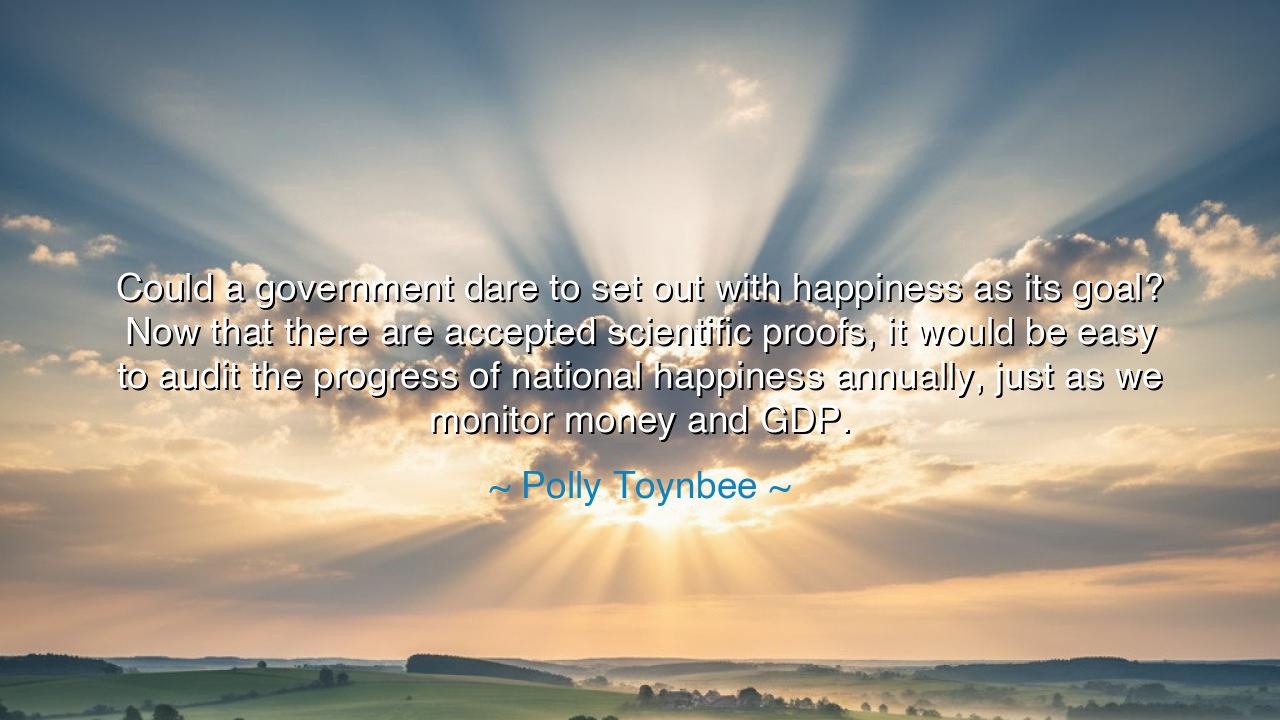
Could a government dare to set out with happiness as its goal?
Could a government dare to set out with happiness as its goal? Now that there are accepted scientific proofs, it would be easy to audit the progress of national happiness annually, just as we monitor money and GDP.






When Polly Toynbee asked, “Could a government dare to set out with happiness as its goal? Now that there are accepted scientific proofs, it would be easy to audit the progress of national happiness annually, just as we monitor money and GDP,” she posed not a mere question, but a challenge to civilization itself. Her words echo across the centuries, daring us to reimagine what power and purpose truly mean. For too long, nations have measured their greatness by the weight of wealth, by the height of buildings, and by the numbers on a ledger. Yet Toynbee, like a prophet among economists, asks: what if the truest measure of progress is not prosperity, but joy? What if a nation’s worth could be found not in its riches, but in the well-being of its people—in the laughter of its children, the dignity of its workers, and the peace within its homes?
The idea she speaks of is not new, though it is rarely embraced. The ancients, long before the rise of modern governments, knew that happiness is the highest good. The philosopher Aristotle taught that all actions aim toward eudaimonia—not fleeting pleasure, but the flourishing of the soul and the harmony of society. Yet through the ages, rulers have strayed from this sacred goal. They sought power, conquest, and wealth, forgetting that prosperity without purpose breeds despair. Toynbee’s words summon us back to this forgotten wisdom, to the understanding that the health of a nation is measured not by gold, but by contentment. She calls upon governments to adopt a higher courage—to place the heart of the people above the hunger for production.
Her question, “Could a government dare,” reveals both hope and reproach. For it is indeed an act of daring to lead with compassion rather than greed, to make happiness a policy rather than an accident. In our age, the instruments of measurement—surveys, psychology, and social science—give form to what was once intangible. We can now trace patterns of despair and joy, of isolation and belonging, just as we track the rise and fall of markets. Yet few leaders have the courage to make such measures their compass. For happiness is a more demanding master than profit—it asks for justice, empathy, and balance, not merely growth. And so Toynbee’s question becomes a mirror: not only for governments, but for each soul that seeks meaning in a world ruled by numbers.
There is, however, one shining example in the tapestry of nations. The small kingdom of Bhutan, hidden in the Himalayas, once declared that it would measure its success not by GDP, but by Gross National Happiness. Its rulers understood that wealth without well-being is hollow, and that the strength of a people lies in the peace of their hearts. Their model, though humble, inspired the world: it taught that progress can be measured not by consumption, but by connection—not by how much one owns, but by how deeply one lives. This, perhaps, is the vision Toynbee imagined: a world where nations are judged by human flourishing, where the true “audit” of progress is not in profits, but in smiles.
To understand her meaning fully, one must also see her warning. When a nation worships only money, it forgets the soul of its citizens. The worker becomes a tool, the artist a luxury, the elder a burden. GDP may rise while happiness falls, and the heart of the people, unseen in statistics, begins to wither. History has shown this again and again—from the industrial empires that crushed their own under progress, to modern powers whose citizens, surrounded by abundance, drown in loneliness. Toynbee reminds us that progress without humanity is decay disguised as success. A society that forgets the happiness of its people will soon find its wealth turned to dust.
Thus, her words carry both philosophical and moral fire. They teach that happiness is not the enemy of seriousness, but its highest expression. To pursue happiness as a collective goal is not to abandon rigor—it is to give meaning to every policy, every law, every institution. It is to remember that governments exist not to rule, but to nurture; that economies are not machines, but gardens of human life. The true art of governance is the art of creating conditions for joy—education that enlightens, labor that dignifies, communities that embrace, and leaders who listen.
So, my children of the future, take this teaching to heart: measure your life not by what you possess, but by what you bring to others’ happiness. Let your ambitions be guided not by greed, but by goodness. In your homes, in your cities, in your nations—ask not, “What do we earn?” but, “Are we well?” For when happiness becomes the goal of humanity, both wealth and wisdom will follow naturally. As Polly Toynbee dared to dream, the day will come when governments and people alike will learn this truth: that the greatest power on earth is the power to create happiness, and that to pursue it, with courage and compassion, is the noblest act of all.






AAdministratorAdministrator
Welcome, honored guests. Please leave a comment, we will respond soon